All English posts
Disappointment. This is Polish feeling for the ruling that the European Court of Human Rights is incompetent to judge whether Russia’s investigation into the 1940 Katyn killings of Polish war prisoners was insufficient.
Foreign Minister Radoslaw Sikorski said that the court’s Grand Chamber had “declined to give a clear judgement.” 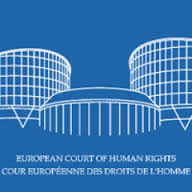
“Poles, including the Polish government, will not cease in their efforts to clarify all aspects of this heinous crime, while also striving for the full rehabilitation of the victims,” he insisted.
The process of rehabilitation is normally applied to those unjustly sentenced in court, and it would clear the victims of any stain on their honour under Russian law.
Sikorski noted nevertheless that the court had “clearly indicated that the Russian Federation did not provide this case and the court itself with sufficient cooperation.”
The court’s Grand Chamber had ruled that the adequacy of Russia‘s 1990-2004 investigation into the WWII massacres cannot be assessed, as the European Convention on Human Rights only came into force in Russia in 1998, eight years after Russia’s Katyn investigation began.
Polish foreign ministry issued an official statement, reiterating Sikorski’s comments, adding that Poland will also continue to demand that Moscow hands over all outstanding case files from its Katyn investigation.
The Katyn killings have been casting a shadow over relations between Poland and Russia for many years now, with Warsaw especially disappointed that Moscow was not willing to transfer documents concerning the massacre for further analysis.
The European court agreed that Russia had failed in this regard by refusing to submit a key procedural decision from the investigation and offered no substantive reason for maintaining its classified status.
From PAP – Radio Poland.
EU enlargement: priorities for 2014. Dossier.
19 Oct 2013 In a set of annual reports adopted, the European Commission recommends granting EU candidate status to Albania and, for the fifth time in a row, the opening of accession negotiations with the former Yugoslav Republic of Macedonia. The Commission also assesses the progress towards EU accession made elsewhere in the Western Balkans and in Turkey over the past year. Given the Icelandic government’s decision to put accession negotiations on hold, a simplified report on Iceland takes stock of the current state of its alignment with the EU. 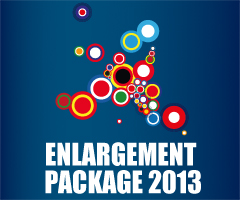
Presenting the annual Enlargement Package, Commissioner Štefan Füle said: ‘Enlargement is a process in the making and despite the economic crisis it is a good policy – it constitutes part of the solution.Enlargement continues to be one of the most effective EU policies. By addressing ‘fundamentals’ first – such as the fight against corruption, sound economic governance, freedom of expression and media, human rights and protection of minorities – it strengthens political and economic stability in the aspiring countries and the EU as a whole.”
The enlargement strategy adopted confirms the continued relevance of the fundamentals of the Copenhagen membership criteria agreed by the EU 20 years ago. These include the rule of law, which remains firmly anchored at the heart of the enlargement process. The countries concerned need to tackle issues such as judicial reform and the fight against organised crime and corruption early in the accession negotiations, to demonstrate a solid track record of sustainable results.
The global economic crisis has underlined the need for all countries to strengthen their economic governance and improve competitiveness. The Commission has set out a number of proposals to support this aim, including the introduction of national economic reform strategies and action plans for public financial management.
Recent events in a number of enlargement countries have underlined the importance of strengthening democratic institutions and making democratic processes more inclusive. All the countries in the Western Balkans and Turkey need to undertake further reforms to ensure that the principles of freedom of expression and the rights of persons belonging to minorities, including Roma are respected in practice. More robust measures are needed to protect other vulnerable groups from discrimination, in particular on grounds of sexual orientation. The Commission will increase the priority attached to these issues in the accession process, including through better targeted pre-accession funding and increased assistance to support Roma inclusion through a Roma “facility”.
Further information – European Union. Full Speech.
“Effective from October 7, Russia has banned the imports of Lithuanian dairy products. The Consumer Protection and Sanitary Inspectorate (Rospotrebnadzor) chief, Gennady Onishchenko, announced the ban…Moscow has not provided any evidence to substantiate its ostensible concerns about food safety…Russia resorts to trade warfare-type measures against neighboring countries (members as well as non-members of the European Union) periodically and selectively…
It is now targeting the European Union’s incumbent presiding country, Lithuania. It no longer bothers to answer Lithuanian and EU inquiries about the basis for complaints. On other fronts, Russia is currently imposing (and threatening to impose more) arbitrary restrictions on trade with the EU’s Eastern Partnership countries—Ukraine, Moldova and Georgia…These countries are set to conclude association, free-trade, and travel visa liberalization agreements with the EU at the Eastern Partnership’s summit on November 28–29 in Lithuania. The Kremlin seeks to derail that process… ”
Full Article – Vladimir Socor – The Lithuania Tribune.
Today we attended the Wilton Park conference, The Eastern Partnership: moving ahead, which included participants from across the EU and from Eastern Partner countries. The Eastern Partnership, with its focus on the future prosperity of Eastern Europe, is at the top of our agendas. Today’s discussion helped shape that future direction. 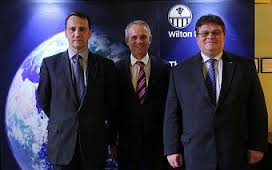
On the 28-29 November, Lithuania will host the third Eastern Partnership Summit in Vilnius. This will be an important moment for the EU and Eastern Europe. The possibility of Ukraine signing its Association Agreement, including a Deep and Comprehensive Free Trade Area, and Moldova and Georgia initialing agreements, will be important milestones towards redefining and strengthening the EU’s relationship with our Eastern European partners.
Eastern partners have already made significant irreversible and sustainable political and economic reforms, which will benefit their citizens. As they continue to grow they need to continue to implement further reforms. Liberalised economies, open and inclusive politics, and respect for the rule of law are all key building blocks for prosperity in the EU from which our eastern partners and others can benefit. We are ready to support partner countries in their efforts to implement reforms and the Association Agreements.
As we look towards the future we hope to see an Eastern Partnership that supports those seeking an ever closer relationship with the EU, and for some eventual EU membership, that supports open economic polices, inclusive democracy and that sustains respect for the rule of law, and we will do all that we can to ensure it.
Linas Linkevičius, Minister of Foreign Affairs of the Republic of Lithuania
Radosław Sikorski, Minister of Foreign Affairs of the Republic of Poland
David Lidington, Minister of State, Foreign and Commonwealth Office, United Kingdom
London – 14 October 2013
Polish emigration close to record level.
14 Oct 2013 According to as of yet unpublished figures from Poland’s Central Statistical Office (GUS), over 2 million Poles were living abroad at the close of 2012.
The data, seen by the Rzeczpospolita daily, marks an increase of about 70,000 since 2011 and 130,000 since 2010.
“If we consider this alongside the demographic trend – the larger number of deaths than births – then we should tell ourselves clearly that the time has come to stop hiding our heads in the sand and that we must take action,” says Professor Krystyna Iglicka from Warsaw’s Lazarski University.
In 2012, Poland’s lower house of parliament passed a law raising the age of retirement to 67 for both sexes, in a bid to combat the changing ratio between workers and pensioners, which is currently 3:1, but may be as high as 1: 1 in 2060.
Around 1.5 million Poles living abroad are below the age of 39 and 726,000 are between 25 and 34.
The most dramatic phase of the exodus was in the first three years after Poland joined the European Union in 2004.
Article – Radio Polska – October 7, 2013.
The exhibition consists of memorabilia related in various ways to the Prince, from the collection of the National Museum in Krakow. 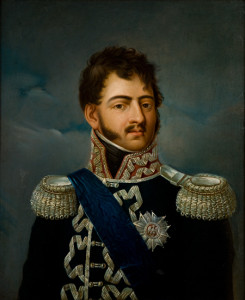
Józef Antoni Poniatowski was born on 7 May 1763 in Vienna to Andrzej Poniatowski and Teresa Kinsky. Bound for a military career, he eventually received the rank of General and became the Marshal of France; he was later announced as the Minister of War and Head of the Army of Warsaw County. On 19 October 1813, while covering the retreat of Napoleon’s forces during the Battle of Leipzig, Prince Józef was killed. His body, pulled out of water after five days, was brought back to Warsaw and buried in the Church of the Holy Cross a year later. His final interment took place on 23 July 1817 in St. Leonard’s Crypt at Wawel Cathedral.
The Prince was a singular character, famous for his military talents and outstanding courage, but also for his adventurous, even extravagant lifestyle, which contributed to his legend when illustrated in numerous works of high and popular art.
As a young man, he was a favourite with the Warsaw ladies, who gave him the nickname of Pepi.
With Poland being progressively partitioned during his uncle’s reign, the young Poniatowski ultimately fought in the anti-Tsarist Kosciuszko Insurrection of 1794.
After Poland had been wiped from the map, he joined forces with Napoleon, who in 1807 created the so-called Duchy of Warsaw, supposedly the kernel of a resurgent Poland.
However, the 1812 campaign, which Bonaparte dubbed his “second Polish war,” ended in disaster, and Poniatowski fell the following year at the Battle of Leipzig.
Legend recounts that the prince spurred his horse into the currents of the River Elster after refusing to surrender, a scene that duly became a staple subject for 19th century Polish painters.
The most common depiction of Prince Józef presents him in a military uniform decorated with medals and a sash across his chest. On the portrait donated to the National Museum’s collection by Adam Wolański in 1906, he is wearing the “great” uniform of the Division Commander, the sash of the Order of the White Eagle, and the star of the Legion of Honour, which he received in 1809. In the same year, Poniatowski was awarded with the highest Polish military decoration – The Grand Cross of the Virtuti Militari Order.
For over a century, he remained the only Pole decorated with such a prestigious medal. The star to the Grand Ribbon of the Virtuti Militari Order is the most precious element of our exhibition.
After the Prince’s death, the star was allegedly brought to Poland by his valet. His heirs then sold it to Henryk Stecki, who presented it as a gift to Emeryk Hutten-Czapski in 1873. The decoration was eventually incorporated into the National Museum’s collection, together with other donations from Hutten-Czapski. In 2006, the unique relic experienced another turn in its history, when it was stolen from an exhibition in Warsaw. Thought to be lost forever, the missing order was eventually found in the Ukraine and re-joined the national collection in 2008.
The exhibition runs at the central branch of the Historical Museum of the City of Krakow until 11 November.
From National Museum in Krakow site
APEC, Bali’s seven points.
9 Oct 2013 Seven highlighted points have been agreed upon during the entire series of meetings held for the Asia-Pacific Economic Cooperation (APEC) in 2013, by the 21th APEC Economic Leaders’ Meeting in Nusa Dua, Bali. 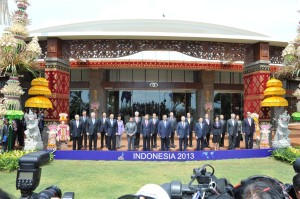
“We have just concluded the 21st APEC Economic Leaders’ Meeting which I chaired. I am pleased to say that our summit went successfully and was indeed very productive. In the course of two days, we discussed thoroughly the central theme of APEC 2013: Resilient Asia-Pacific, Engine of Global Growth. After our intensive deliberations, we agreed on a number of strategic points. Let me now highlight seven of them,” stated the Indonesian President, Susilo Bambang Yudhoyono, at the Bali Nusa Dua Convention Centre (BNDCC), on Tuesday (8/10).
First, the APEC Leaders agreed to redouble efforts to attain the Bogor Goals by 2020. APEC Leaders shared a view that all economies must continue to gain from APEC. In line with this commitment, APEC Leaders have also agreed to take further steps to empower, attract and open opportunities for all stakeholders, to participate in APEC.
Second, APEC Leaders agreed to increase intra-APEC trade, or intra-regional trade in Asia-Pacific, including trade facilitation, capacity building, and the functioning of multilateral trading system. The multilateral trading system is recognition that the promotion of intra-regional trade cooperation in Asia and the Pacific brings concrete benefits to APEC economies. “In this regard, we have agreed on a declaration which supports the multilateral trading system. We have also agreed to ensure the success of the upcoming 9th WTO Ministerial Conference in Bali, in December 2013,” President Yudhoyono explained.
Third, APEC Leaders agreed to expedite people-to-people connectivity. In this regard, the strategic landscape for connectivity through the development of and investment in infrastructure. Connectivity may help reduce production and transportation cost, strengthen the regional supply chain, and improve the regional business climate. At the same time, infrastructure development and connectivity will create more jobs and ensure job security.
Fourth, APEC Leaders reaffirmed their commitments to the attainment of strong, balanced, sustainable and inclusive global growth. To this end, APEC Leaders agreed to facilitate Small, Middle, and Micro Enterprises (SMMEs), youth, and female entrepreneurs. SMMEs are the backbone of the economy.
Fifth, bearing in mind resource scarcity, APEC Leaders agreed to establish regional collaboration in order to improve food, energy and water security. This effort was aimed at addressing challenges to population growth and the adverse impacts of climate change. “At this Bali summit, we began to look at this matter in a holistic manner,” said President Yudhoyono.
Sixth, APEC Leaders have agreed to ensure synergy in APEC and complement each others multilateral and regional processes, such as the East Asia Summit and G20. This is essential because the world is marked by multiple architectures of economic partnerships.
Seventh, APEC Leaders agreed upon close cooperation with the business sector through ABAC to accomplish free and open trade and investment. Collaboration will result in a win-win situation, in particular at the time when the global economy has yet to fully recover.
“Now that we have all these agreements and commitments, we must show the world that APEC will continue to play a significant role in global economy. I believe that all APEC economies will share responsibility to live up to these commitments,” he added.
The People’s Republic of China (PRC) has officially accepted the chairmanship of the Asia-Pacific Economic Cooperation (APEC) 2014.
Chinese Xi Jinping called for improved connectivity under the Asia-Pacific Economic Cooperation mechanism as part of efforts to promote economic integration and renewed his call to establish an Asian investment bank to finance infrastructure construction.
Connectivity is vital to the Asia-Pacific region, which covers 21 economies and is home to a population of 2.8 billion, the president said.
“China is keen to explore and develop investment and financing channels for infrastructure construction,” he add.
Wei Jianguo, secretary-general of the China Center for International Economic Exchanges, a government think tank, said that promoting connectivity can help rebalance industrial structures and upgrade growth patterns among APEC economies.
For developing economies in the region, a priority is to shift export-oriented economies into ones that depend more on “domestic power”, he explained.
“It is crucial to improve coordination and information sharing among top-level government officials, as well as strengthen coordination on macroeconomic policies and jointly promote regional development,” he added.
According to the International Monetary Fund, APEC members account for 54 percent of global GDP. Their economies, as a whole, are expected to grow 6.3 percent in 2013 and 6.6 percent in 2014.
Nusa Dua, APEC 2013 – October 8, 2013.
Central Asia, The Chinese Silk Road.
7 Oct 2013 China has spent more than $50bn in the past three months on energy and infrastructure deals in central Asia as Beijing seeks to establish a “new Silk Road” through the region. 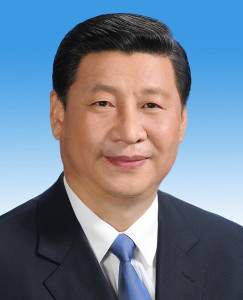
Chinese outbound investment totalled just over $100bn in the third quarter of 2013 with around half of that sum spent in the central Asian states visited by the Chinese president Xi Jinping on an official tour last month.
Xi visited Turkmenistan, Kazakhstan, Uzbekistan and Kyrgyzstan in September and signed sizable business deals with all four countries. The pattern of spending confirms that Chinese foreign investment flows are largely determined by the political leadership…
China has come under criticism for engaging in modern-day “colonialism” for its extensive energy and infrastructure investments and soft loans in Africa over the past decade. Beijing has also been accused of propping up repressive regimes in the continent. But others have pointed out that attitudes to China among many ordinary Africans are often more positive than attitudes towards Western states.
China’s largest financial agreements over the third quarter were related to energy infrastructure projects. In Kazakhstan China signed 22 agreements worth a combined total of $30bn. This included a $5bn deal for the China National Petroleum Corporation to acquire an 8 per cent stake in the Kashagan Oil & Gas field.
In Uzbekistan China signed 31 deals worth $15.5bn. The two countries agreed to build another oil pipeline, taking the total to four. And China is already funding the construction of an Uzbek-Chinese cross-border railway line. China concluded $7.6bn worth of deals in Turkmenistan, including the construction of a new pipeline. In Kyrgyzstan China signed eight agreements worth $5bn, the largest of which was a $1.4bn loan to build a new gas pipeline.
China also signed 36 co-operation agreements with an aggregate value of $1.5bn with Belarus. This included a soft loan from China’s state-owned development bank, Exim, to construct Belarus’s first nuclear power plant.
Full Article – The Independent. October 3rd, 2013.
Russia’s Energy Dominance in Danger.
6 Oct 2013“The U.S. is overtaking Russia as the world’s largest producer of oil and natural gas, a startling shift that is reshaping markets and eroding the clout of traditional energy-rich nations. 
A Wall Street Journal analysis of global data shows that the U.S. is on track to pass Russia as the world’s largest producer of oil and gas combined this year—if it hasn’t already…
The U.S. produced the equivalent of about 22 million barrels a day of oil, natural gas and related fuels in July, according to figures from the EIA and the International Energy Agency. Neither agency has data for Russia’s gas output this year, but Moscow’s forecast for 2013 oil-and-gas production works out to about 21.8 million barrels a day.
U.S. imports of natural gas and crude oil have fallen 32% and 15%, respectively, in the past five years, narrowing the U.S. trade deficit…
The U.S. last year tapped more natural gas than Russia for the first time since 1982, according to data from the International Energy Agency…
The U.S. is also catching up in the race to pump crude. Russia produced an average of 10.8 million barrels of oil and related fuel a day in the first half of this year. That was about 900,000 barrels a day more than the U.S.—but down from a gap of three million barrels a day a few years ago, according to the IEA…
The amount of crude from two of the hottest plays in the U.S.—the Bakken oil field in North Dakota and the Eagle Ford shale formation in South Texas—continues to rise rapidly, while Russian output has increased modestly over the past three years.
The Russian government predicts oil output will remain flat through 2016, while natural gas ticks up 3%. The shift has raised concerns in Moscow that U.S. crude supplies will crowd out Russia’s oil exports.
Russian Academy of Sciences’ Energy Research Institute has forecast that Russian oil exports could fall 25% to 30% after 2015, reducing gross domestic product more than $100 billion…
Saudi Arabia remains the world’s largest supplier of crude oil and related liquids… ”
Full Article – WSJ – October 2, 2013.
Russia. Glonass also for satellites.
5 Oct 2013The Russian Defense Ministry is planning to use the country’s Glonass global positioning and navigation satellite network to operate other satellites in orbit. 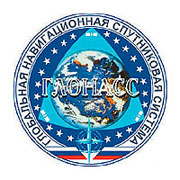
“Glonass will be used extensively in the future to control spacecraft,” said Sergei Berezhnoi, an aide to the head of the Titov Space Control Center, Russia’s main satellite control center.
According to the official, the Glonass system will also render automated assistance in the search for “missing” satellites with which operators on the ground have lost contact.
“In addition, this system could be used to help fix satellite glitches without the involvement of ground control facilities,” he added.
Glonass (Global Navigation Satellite System), which was officially launched in 1993, is Russia’s answer to the US Global Positioning System (GPS). It provides real-time positioning and speed data for surface, sea and airborne objects with an accuracy of one meter.
The Glonass system requires at least 18 operational satellites for continuous navigation services across the entire territory of Russia and 24 satellites to provide navigation services worldwide.
A group of 29 Glonass satellites is currently in orbit: 24 are currently in operation, three are spares, one is in maintenance, and one is in test flight phase, according to Russia’s space agency, Roscosmos.
By 2020, Russia plans to have 30 Glonass-M and new-generation Glonass-K satellites in orbit, including six in reserve, Roscosmos has said.
Russian President Vladimir Putin called on the members of the Commonwealth of Independent States (CIS) to join Glonass.
“This system has the capability to provide considerable benefits in the economic sphere, since it reduces cargo transportation costs on all transportation systems, and it definitely increases the safety of all types of transportation,” Putin said at a session of leaders of CIS member states in December 2012.
From Ria Novosti
Welcome
We are a group of long experienced European journalists and intellectuals interested in international politics and culture. We would like to exchange our opinion on new Europe and Russia.
Categories
- Breaking News (11)
- CIS (129)
- Climate (2)
- Energy&Economy (115)
- EU Eastern Dimension (85)
- Euro 2012 – Sochi 2014 – World Cup 2018, Sport (43)
- Euro-Integration (135)
- History Culture (198)
- International Policy (261)
- Military (74)
- Interviews (18)
- Italy – Italia – Suisse (47)
- Odd Enough (10)
- Poland and Baltic States (126)
- Religion (31)
- Russia (421)
- Survey (4)
- Turning points (4)
- Ukraine (176)
- Российские страницы (113)
Archives
- November 2020
- October 2020
- September 2020
- August 2020
- July 2020
- May 2020
- April 2020
- March 2020
- January 2020
- December 2019
- November 2019
- October 2019
- September 2019
- August 2019
- July 2019
- June 2019
- May 2019
- April 2019
- March 2019
- February 2019
- December 2018
- November 2018
- October 2018
- September 2018
- August 2018
- July 2018
- June 2018
- May 2018
- April 2018
- March 2018
- February 2018
- January 2018
- December 2017
- November 2017
- October 2017
- September 2017
- August 2017
- July 2017
- May 2017
- March 2017
- January 2017
- December 2016
- November 2016
- October 2016
- September 2016
- July 2016
- June 2016
- May 2016
- April 2016
- February 2016
- January 2016
- November 2015
- October 2015
- September 2015
- June 2015
- April 2015
- March 2015
- February 2015
- January 2015
- December 2014
- November 2014
- October 2014
- September 2014
- August 2014
- July 2014
- June 2014
- May 2014
- April 2014
- March 2014
- February 2014
- January 2014
- December 2013
- November 2013
- October 2013
- September 2013
- August 2013
- July 2013
- June 2013
- May 2013
- April 2013
- March 2013
- February 2013
- January 2013
- December 2012
- November 2012
- October 2012
- September 2012
- August 2012
- July 2012
- June 2012
- May 2012
- April 2012
- March 2012
- February 2012
- January 2012
- December 2011
- November 2011
- October 2011
- September 2011
- August 2011
- July 2011
- June 2011
- May 2011
- April 2011
- March 2011
- February 2011
- January 2011
- December 2010
- November 2010
- October 2010
- September 2010
- August 2010
- July 2010
- June 2010
- May 2010
- April 2010
- March 2010
- February 2010
- January 2010
- December 2009
- November 2009
- October 2009
- September 2009
- August 2009
Our books




